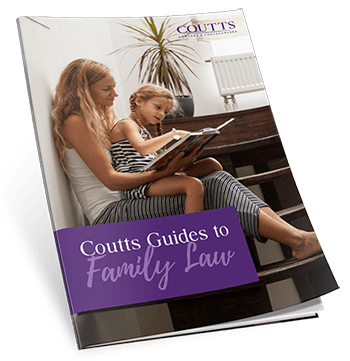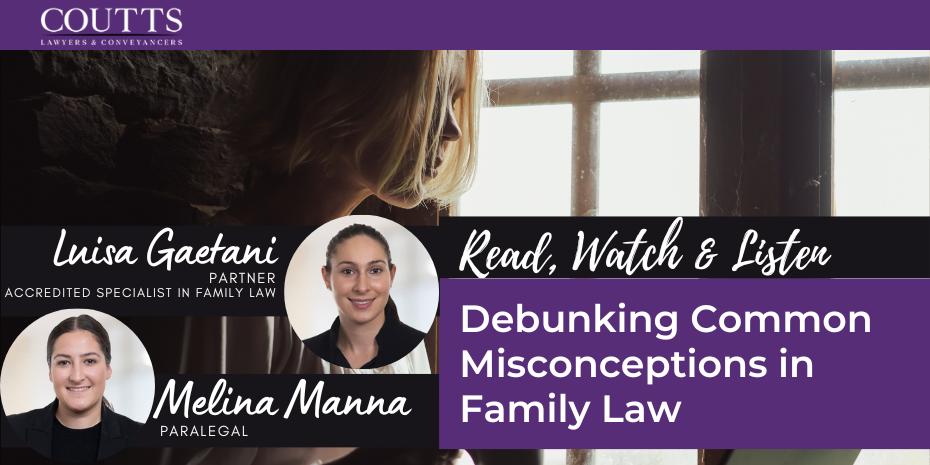We’ve Got You Covered
Coutts offers expert legal representation for individuals dealing with parenting after separation. Our dedicated team includes an Accredited Family Law Specialist who is highly experienced in handling the intricacies of Family Law cases. We understand the sensitivity and complexity of Family Law matters, and we are committed to protecting the rights and well-being of our clients with compassion and precision.

Luisa Gaetani
Partner & Accredited Family Law Specialist
Book Your Parenting After Separation Consultation Now
Making Parenting Arrangements After Separation
Making decisions about parenting arrangements after separation can be a very difficult process. Under the Family Law Act, all couples are required to attempt to resolve parenting matters outside of court. The Family Law Act requires that all parties attend mediation with a Family Dispute Resolution service before they can go to court. There are some exceptions to this rule, mainly if there are concerns for a person’s safety.
If the matter is not suitable for mediation, or mediation is unsuccessful, parties will be issued with a Section 60I certificate. This certificate allows either party to make an Application to the Court to have the matter determined by a Judge. It is also very important to note that the Family Law Act says that all decisions that are made about children must be to uphold the best interests of the child.
Under the Family Law Act, lawyers need to look at lots of information before assessing what is right for children, however, the main priority is always what is in the children’s best interests. When determining what is in a child’s best interests, the following things are generally assessed:
- The benefit of the child/ren having a meaningful relationship with both parents.
- Ensuring the children are prevented from harm/family violence or risk either physically or psychologically.
- The effect of any change in living arrangements on the child/ren.
- A history of family violence in either household.
- The lifestyle, maturity and background of the child/ren and the child/ren’s parents.
- Each parent’s capacity to facilitate a meaningful relationship between the child/ren and the other parent.
- Depending on the age of the child/ren, their wishes can also be taken into consideration.
Under Section 61DA (1) of the Family Law Act 1975 there is a presumption that both parents will share equal shared parental responsibility for the Children. This means that both parents will consult each other and make joint decisions about major issues such as religion, education, health and housing. In certain circumstances, such as in the presence of family violence, the presumption will not apply, and parental responsibility will be provided to only one parent under Section 61DA (2) of the Family Law Act 1975.
Following an Order for equal shared parental responsibility, the Court must consider as a starting point for determining the amount of time the Children spend with each parent, whether it is in the child’s best interests and reasonably practicable that the Children spend equal time with each parent (Section 65DAA (1) of the Family Law Act 1975).
If the Court considers that it is not in the child’s best interests, or reasonably practicable for the children to spend equal time with each parent, the Court will then consider whether it is in the child’s best interests and reasonably practicable that the Children spend substantial and significant time with each parent (Section 65DAA (2) of the Family Law Act 1975). Section 65DAA (3) of the Family Law Act 1975 states that substantial and significant time must include days that fall on weekends and holidays as well as days that do not fall on weekends or holidays. In addition, the time must allow the parent to be involved in the child’s daily routine and occasions and events that are of particular significance to the child and the parent.
How can Coutts help?
Our Family Law Lawyers have extensive experience in assisting parents to reach a solution that serves the children’s best interests and can be tailored to meet the needs of the family.
What to Expect with Coutts Lawyers
Step 1: Initial Contact
Reach out to Coutts Lawyers via our website, phone, or in person. Briefly describe your matter.
Step 2: Consultation Appointment
Schedule and attend a meeting with a Coutts lawyer to discuss the specifics of your matter and desired outcomes.
Step 3: Information & Legal Advice
Share all related documents and information. Your lawyer will review everything, clarify aspects as needed, and then advise on the best action course.
Step 4: Action Plan Development
Based on the advice, an appropriate action plan will be formulated. This may involve communication, documentation processes, or further legal steps.
Step 5: Implementation
Execute the action plan, addressing a range of legal scenarios as necessary.
Step 6: Resolution & Closure
Navigate towards a resolution, with the path determined by the nature of the matter. Your Lawyer will outline any final actions or considerations.
Book Your Parenting After Separation Consultation Now
Introducing Luisa
Your Compassionate Lawyer
Meet Luisa, a Partner at Coutts Lawyers & Conveyancers, and an Accredited Family Law specialist. Luisa is the head of our esteemed Family Law team. Boasting over a decade of expertise, Luisa blends sensitivity with practicality, forging deep connections and trust with her clients. Her reputation as a foremost authority in Criminal and Family law is well-deserved.


Connect with Luisa Today
Multi Award-Winning
Law Firm

Parenting After Separation FAQ’s
Settling parenting arrangements outside of court is crucial as it promotes a conducive and amicable environment, reducing legal strains and costs, with the primary focus being on upholding the children’s best interests. It also provides a platform for parents to collaboratively decide on arrangements that best suit the family dynamics and the children’s needs.
The Family Law Act enforces the principle that the children’s best interests are paramount. It stipulates criteria such as the benefit of meaningful relationships with both parents, protection from harm, and consideration of the child’s lifestyle, maturity, and background. It mandates equal shared parental responsibility under normal circumstances and emphasises the importance of both parents’ being involved in major decisions related to the child.
Coutts has experienced Family Law Lawyers who specialise in assisting parents in creating solutions that serve their children’s best interests. Our team provide comprehensive support and legal advice to navigate through the complexities of family law and help in tailoring arrangements that accommodate the unique needs of each family.
Yes, depending on the age and maturity of the children, the children’s wishes can be taken into consideration when determining parenting arrangements to ensure that the arrangements align with the child’s preferences and well-being.
If mediation is unsuccessful or unsuitable, parties are issued a Section 60I certificate, allowing them to make an Application to the Court to have the matter determined by a Judge, who will make decisions based on upholding the best interests of the child.
Download your FREE Family Law Guide!



